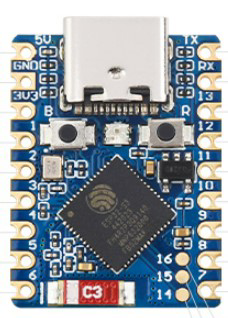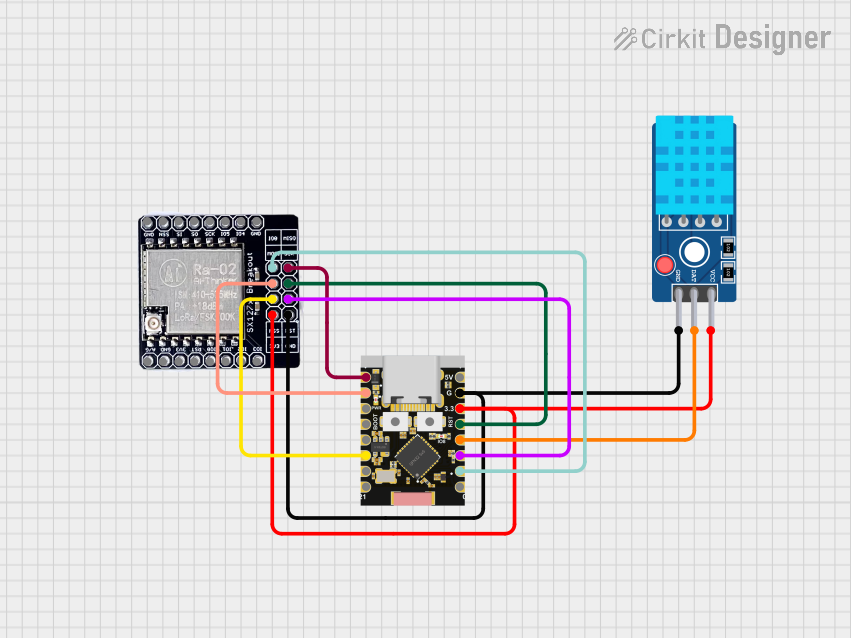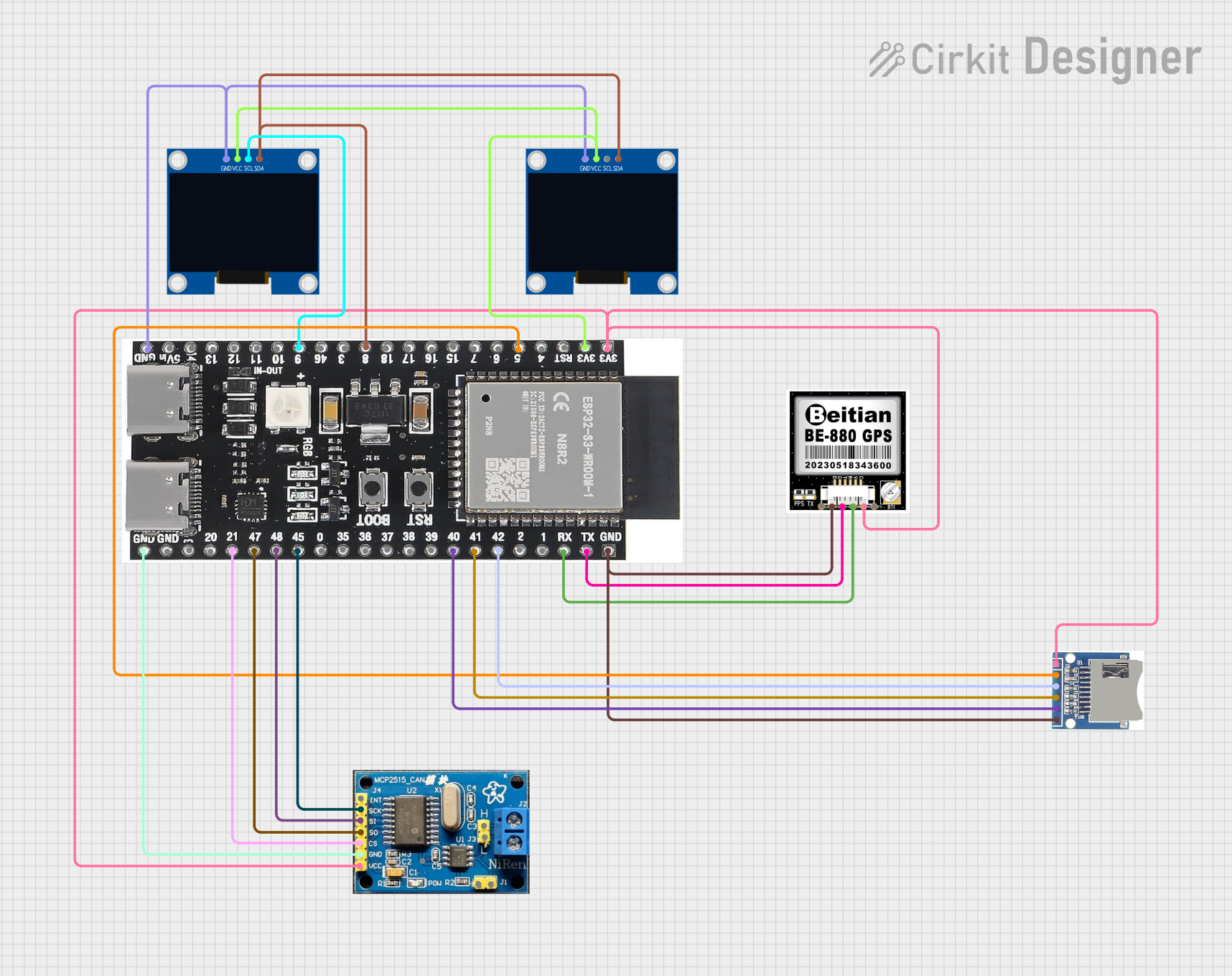
How to Use ESP32-S3 Super Mini 4MB : Examples, Pinouts, and Specs

 Design with ESP32-S3 Super Mini 4MB in Cirkit Designer
Design with ESP32-S3 Super Mini 4MB in Cirkit DesignerIntroduction
The ESP32-S3 Super Mini 4MB, manufactured by Nologo, is a compact and powerful microcontroller designed for IoT and embedded system applications. It features integrated Wi-Fi and Bluetooth 5.0 (LE) capabilities, making it an excellent choice for wireless communication projects. With 4MB of flash memory, this module is well-suited for applications requiring moderate storage and high performance in a small form factor.
Explore Projects Built with ESP32-S3 Super Mini 4MB

 Open Project in Cirkit Designer
Open Project in Cirkit Designer
 Open Project in Cirkit Designer
Open Project in Cirkit Designer
 Open Project in Cirkit Designer
Open Project in Cirkit Designer
 Open Project in Cirkit Designer
Open Project in Cirkit DesignerExplore Projects Built with ESP32-S3 Super Mini 4MB

 Open Project in Cirkit Designer
Open Project in Cirkit Designer
 Open Project in Cirkit Designer
Open Project in Cirkit Designer
 Open Project in Cirkit Designer
Open Project in Cirkit Designer
 Open Project in Cirkit Designer
Open Project in Cirkit DesignerCommon Applications and Use Cases
- IoT Devices: Smart home automation, environmental monitoring, and connected appliances.
- Wearable Technology: Fitness trackers, health monitoring devices, and smart accessories.
- Embedded Systems: Robotics, industrial automation, and sensor networks.
- Prototyping: Ideal for rapid development of wireless communication projects.
- Edge Computing: Lightweight AI/ML applications at the edge.
Technical Specifications
Key Technical Details
| Parameter | Value |
|---|---|
| Microcontroller | ESP32-S3 (Xtensa® 32-bit LX7 dual-core processor) |
| Clock Speed | Up to 240 MHz |
| Flash Memory | 4MB |
| RAM | 512KB SRAM + 8MB PSRAM (optional, depending on variant) |
| Wireless Connectivity | Wi-Fi 802.11 b/g/n (2.4 GHz), Bluetooth 5.0 (LE) |
| GPIO Pins | 14 (configurable for digital I/O, ADC, PWM, I2C, SPI, UART, etc.) |
| Operating Voltage | 3.3V |
| Input Voltage Range | 3.0V to 3.6V |
| Power Consumption | Ultra-low power consumption in deep sleep mode (~10 µA) |
| Dimensions | 20mm x 15mm |
| Operating Temperature Range | -40°C to +85°C |
Pin Configuration and Descriptions
| Pin Name | Type | Description |
|---|---|---|
| GND | Power | Ground pin. Connect to the ground of the power supply. |
| 3V3 | Power | 3.3V power input. |
| EN | Input | Enable pin. Pull high to enable the module, low to disable. |
| IO0 | GPIO/Boot Mode | General-purpose I/O pin. Used for boot mode selection during programming. |
| IO1-IO13 | GPIO | Configurable as digital I/O, ADC, PWM, I2C, SPI, or UART. |
| RXD | UART Input | UART receive pin. |
| TXD | UART Output | UART transmit pin. |
| ADC1/ADC2 | Analog Input | Analog-to-digital converter pins. |
| RST | Input | Reset pin. Active low. |
Usage Instructions
How to Use the ESP32-S3 Super Mini 4MB in a Circuit
Powering the Module:
- Supply a stable 3.3V to the
3V3pin. Ensure the power source can provide sufficient current (at least 500mA). - Connect the
GNDpin to the ground of your circuit.
- Supply a stable 3.3V to the
Programming the Module:
- Use a USB-to-UART adapter to connect the module to your computer.
- Connect the adapter's TX pin to the module's RXD pin.
- Connect the adapter's RX pin to the module's TXD pin.
- Connect the adapter's GND to the module's GND.
- Hold the
IO0pin low (connect to GND) while resetting the module to enter bootloader mode.
- Use a USB-to-UART adapter to connect the module to your computer.
Connecting Peripherals:
- Use the GPIO pins for interfacing with sensors, actuators, or other devices.
- Configure the pins in your code for the desired functionality (e.g., digital I/O, ADC, PWM).
Wireless Communication:
- Use the built-in Wi-Fi and Bluetooth capabilities for wireless data transmission.
- Configure the network settings in your firmware to connect to a Wi-Fi network or pair with Bluetooth devices.
Important Considerations and Best Practices
- Voltage Levels: Ensure all connected peripherals operate at 3.3V logic levels to avoid damaging the module.
- Antenna Placement: Avoid placing metal objects or other components near the onboard antenna to ensure optimal wireless performance.
- Power Supply: Use a low-noise, stable power supply to prevent issues with Wi-Fi and Bluetooth connectivity.
- Deep Sleep Mode: Utilize the deep sleep mode to minimize power consumption in battery-powered applications.
Example Code for Arduino UNO Integration
The ESP32-S3 can be programmed using the Arduino IDE. Below is an example of connecting the module to a Wi-Fi network:
#include <WiFi.h> // Include the Wi-Fi library for ESP32
// Replace with your network credentials
const char* ssid = "Your_SSID";
const char* password = "Your_PASSWORD";
void setup() {
Serial.begin(115200); // Initialize serial communication
delay(1000); // Wait for serial monitor to initialize
Serial.println("Connecting to Wi-Fi...");
WiFi.begin(ssid, password); // Start Wi-Fi connection
// Wait until the module connects to the Wi-Fi network
while (WiFi.status() != WL_CONNECTED) {
delay(500);
Serial.print(".");
}
Serial.println("\nConnected to Wi-Fi!");
Serial.print("IP Address: ");
Serial.println(WiFi.localIP()); // Print the module's IP address
}
void loop() {
// Add your main code here
}
Troubleshooting and FAQs
Common Issues and Solutions
Module Not Powering On
- Cause: Insufficient or unstable power supply.
- Solution: Ensure the power source provides a stable 3.3V with at least 500mA current.
Cannot Upload Code
- Cause: Incorrect boot mode or UART connection.
- Solution: Hold the
IO0pin low while resetting the module to enter bootloader mode. Verify the TX and RX connections.
Wi-Fi Connection Fails
- Cause: Incorrect SSID or password, or weak signal strength.
- Solution: Double-check the network credentials and ensure the module is within range of the Wi-Fi router.
Bluetooth Not Discoverable
- Cause: Bluetooth not initialized in the code.
- Solution: Ensure the Bluetooth stack is properly configured in your firmware.
GPIO Pins Not Responding
- Cause: Incorrect pin configuration or voltage mismatch.
- Solution: Verify the pin mode in your code and ensure connected peripherals operate at 3.3V logic levels.
FAQs
Q: Can the ESP32-S3 Super Mini 4MB operate on 5V?
A: No, the module operates at 3.3V. Connecting 5V directly to the pins may damage the module.
Q: How do I reset the module?
A: Pull the RST pin low momentarily to reset the module.
Q: Is the module compatible with Arduino libraries?
A: Yes, the ESP32-S3 is supported by the Arduino IDE and many libraries designed for ESP32.
Q: Can I use the module for battery-powered applications?
A: Yes, the module's ultra-low power consumption in deep sleep mode makes it suitable for battery-powered projects.
This concludes the documentation for the ESP32-S3 Super Mini 4MB.